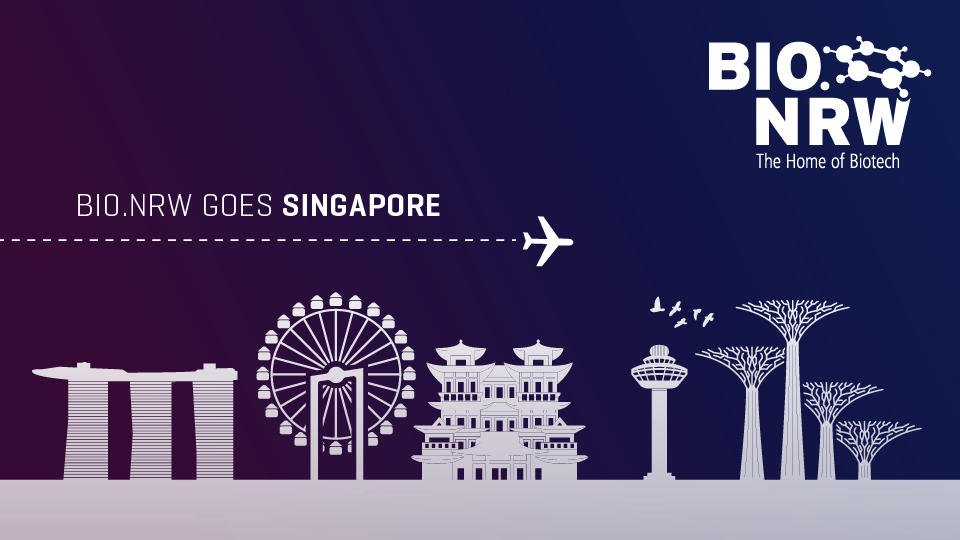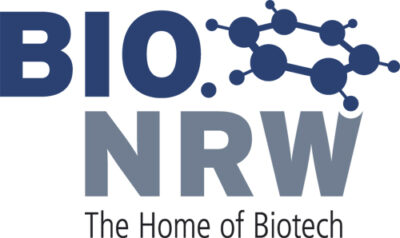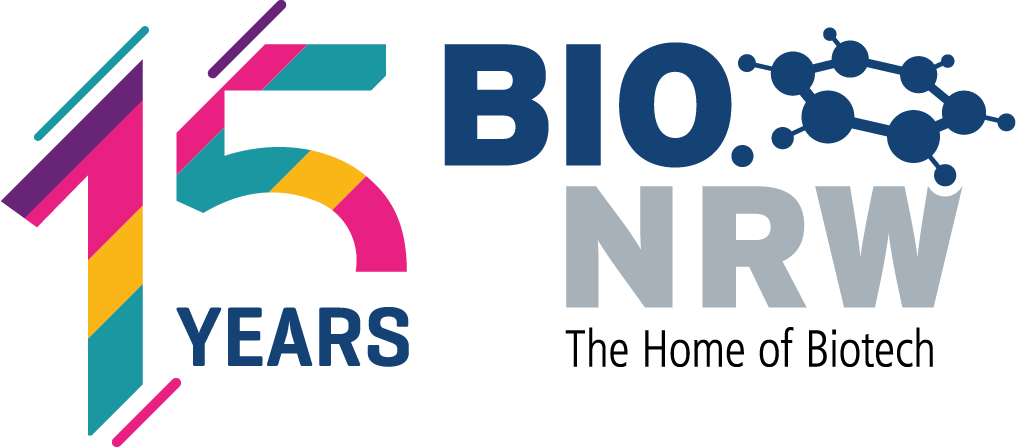
Webinar zum Biotech-Standort Singapur
Das Webinar gibt einen Überblick des zunehmend an Bedeutung gewinnenden Biotechnologie-Standortes Singapur und dessen Funktion als Hub für die Erschließung des wachsenden ASEAN-Marktes. Neben den wirtschaftlichen Aspekten werden auch die Lebensbedingungen für Expats von deutschen Life-Science Arbeitnehmern in Singapur geschildert. Das Webinar richtet sich vornehmlich an Biotechnologie-Unternehmen (Startups, KMUs, Großunternehmen) aus NRW und Deutschland. Alle weiteren interessierten Gäste sind herzlich willkommen.
Programm
10:00 – 10:10 Uhr Begrüßung – Dr. Nils Schrader, Managing Director, BIO.NRW
10:05 – 10:20 Uhr Vorstellung NRW Global Business – Astrid Becker, General Manager Asia | Australia & Yazmin Stoffer, Head of Business Unit ASEAN
10:20 – 10:40 Uhr Bedeutung Singapurs als HUB für die ASEAN-Region & Wirtschaftszahlen zu Singapur – Werner Kemper, Director Malaysia, Singapore, Brunei, Germany Trade & Invest mbH
10:40 – 11:00 Uhr Life Science Business Vergleich Singapur vs. Deutschland – Prof. Michael Rossbach, Managing Partner, Ikxinta Pte. Ltd.
11:00 – 11:20 Uhr Leben in Singapur als Deutscher – Dirk Jablonski, Snr. Manager Process Engineering, West Pharmaceuticals Services Singapore Pte. Ltd.
11:20 – 11:30 Ausblick über die BIO.NRW Delegationsreise nach Singapur vom 22. – 26. April 2024 – Uwe Stetskamp, BIO.NRW
11:30 – 12:00 Uhr Fragen und Diskussion
Informationen über den Biotechnologie-Markt Singapur:
Biopharmazeutische Biotechnologie:
Singapur zeigt bereits seit 2020 seinen Anspruch, das biomedizinische Zentrum Asiens zu werden, denn bereits 2020 rief es die nationale Initiative für biomedizinische Wissenschaften ins Leben. Diese führte zur Gründung von Biopolis (einem F&E-Zentrum für biomedizinische Wissenschaften), zur Anwerbung international renommierter Wissenschaftler und zur Ansiedlung multinationaler Pharmakonzerne wie z. B. Pfizer, Novartis, GSK usw. in Singapur. Auch die Investitionen der Regierung Singapurs in den biomedizinischen Sektor sowie in Wissenschaft, Technologie und Innovation haben in den letzten 20 Jahren stetig zugenommen.
Im Dezember 2020 hat der Nationale Forschungsfonds (NRF) den Plan RIE2025 ins Leben gerufen, der für den Zeitraum 2021 bis 2025 Investitionen in Höhe von 25 Mrd. SGT-Dollar (1 % des BIP von Singapur, d. h. eine Steigerung um mehr als 30 % im Vergleich zu RIE2020) in Forschung und Innovation vorsieht. “Gesundheit” ist einer der vier Schlüsselbereiche von RIE2025, mit den Hauptschwerpunkten Infektionskrankheiten und Präzisionsmedizin.
Industrielle Biotechnologie (inkl. Agrar- und Lebensmittelsektor):
Die Regierung Singapurs will die Eigenproduktion von Lebensmitteln bis 2030 auf 30 Prozent erhöhen. Damit dies gelingen kann investiert der Stadtstaat in Agrar- und Biotechnologie-Startups. Der Staatsfonds, Temasek, hat fast 3 Mrd. US-Dollar in die urbane Lebensmittelwirtschaft investiert und unterstützt Unternehmen und Scale-ups in Bereichen wie Biotechnologie, alternative Proteine und vertikale Landwirtschaft. Bereits 2020 war Singapur das erste Land weltweit, das im Labor erzeugtes Fleisch zum kommerziellen Verkauf an Verbraucher zugelassen hat.
Sollten Sie Fragen haben, melden Sie sich bitte bei Uwe Stetskamp.

| 28.09.2023 10:00 – 12:00 Uhr (CET) | ||
| Online | ||
| Kostenfreie Registrierung | ||
| Programm siehe links im Fließtext | ||
| Kontakt |
Melden Sie sich jetzt an!
Quellen: [1] Biotech Connection Singapore, end of 2020. [2] Singapore’s role within the growing urban food ecosystem: Turning old limitations into new strength, EDB & Deloitte; EDB Webpage
English Version:
Webinar on Singapore as a Biotechnology Hub
This webinar will provide an introduction to the increasing importance of Singapore as a location for biotechnology and its role as a hub in terms of exploiting the growing ASEAN market. In addition to economic aspects, the living conditions of expats working for German life science employers in Singapore will be outlined. The webinar is primarily aimed at biotechnology enterprises (start-ups, SMEs, large enterprises) in NRW and Germany. Other interested parties are also invited to attend.
Programme
10:00–10:10 Welcome address – Dr. Nils Schrader, Managing Director, BIO.NRW
10:05–10:20 Introduction NRW Global Business – Astrid Becker General Manager Asia | Australia
10:20–10:40 Importance of Singapore as a hub for the ASEAN region & economic figures for Singapore – Werner Kemper, Director Malaysia, Singapore, Brunei, Germany Trade & Invest mbH
10:40–11:00 Life Science Business Comparison Singapore vs. Germany – Prof. Michael Rossbach, Managing Partner, Ikxinta Pte. Ltd.
11:00–11:20 Living in Singapore as a German – Dirk Jablonski, Snr. Manager Process Engineering, West Pharmaceuticals Services Singapore Pte. Ltd.
11:20–11:30 Summary and outlook for BIO.NRW delegation travelling to Singapore on 22–26 April 2024 – Uwe Stetskamp, BIO.NRW
11:30–12:00 Questions and discussion
Information on Singapore as a biotechnology market :
Biopharmaceutical biotechnology:
Singapore signalled its intentions to become the biomedical centre of Asia when it launched its national Biomedical Sciences Initiative in 2020. This initiative led to the foundation of Biopolis (an R&D centre for biomedical sciences), the recruiting of internationally recognized scientists, and the arrival of multinational pharmaceutical companies like Pfizer, Novartis, GSK, etc. in Singapore. Government investments in Singapore’s biomedical sector as well as in science, technology, and innovation have steadily increased over the last 20 years.
In December 2020, the National Research Foundation (NRF) launched the RIE2025 plan, which foresees investments in research, innovation, and enterprise totalling S$ 25 billion over the period 2021–2025 (1% of Singapore’s GDP, representing an increase of more than 30 % compared to RIE2020). “Health” is one of the four strategic domains of RIE2025 with a focus on infectious diseases and precision medicine.
Industrial biotechnology (incl. agri-food sector):
Singapore’s government aims to produce 30% of the country’s nutritional needs locally by 2030. To make this possible, the city state is investing in agricultural and biotechnology start-ups. The state fund, Temasek, has invested almost US$ 3 billion in the urban food sector and it supports enterprises and scale-ups working in areas such as biotechnology, alternative proteins, and vertical farming. Back in 2020, Singapore became the first country in the world to allow lab-grown meat to be sold to consumers.
Should you have any further questions, please contact Uwe Stetskamp.
